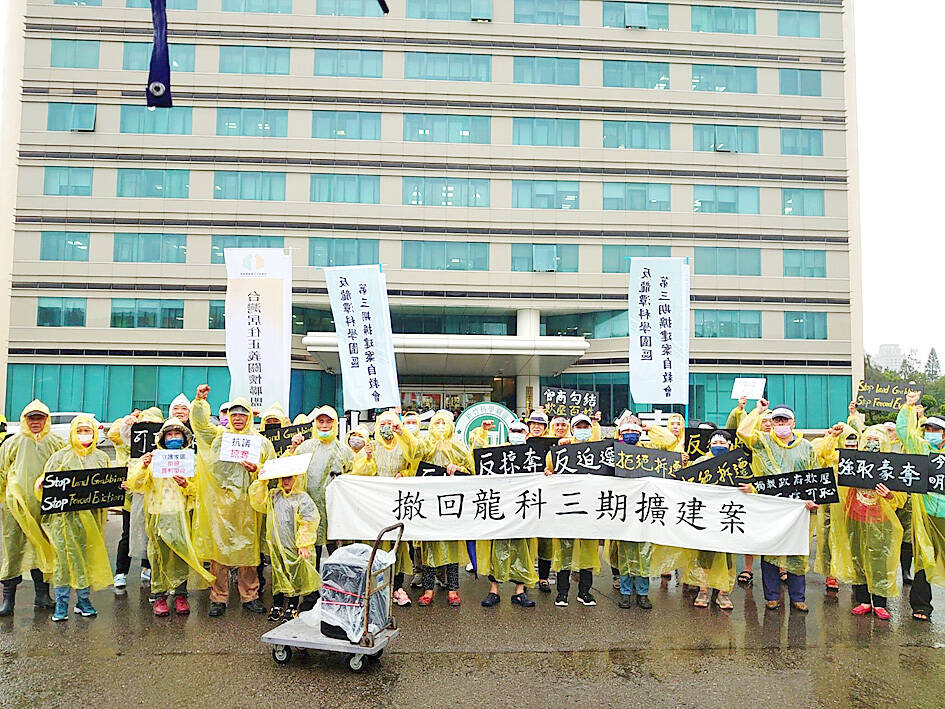The government is to assist Taiwan Semiconductor Manufacturing Co (TSMC, 台積電) search for a suitable site for an advanced wafer fab, National Development Council (NDC) Minister Kung Ming-hsin (龔明鑫) said yesterday.
Kung’s comments come amid claims from local residents that TSMC has agreed to abandon a planned expansion project in the Longtan (龍潭) section of Hsinchu Science Park (新竹科學園區).
Chinese Nationalist Party (KMT) caucus whip William Tseng (曾銘宗) asked the minister, who sites on TSMC’s board of directors, whether the government — the chipmaker’s single largest investor with a 6.38 percent stake — was aware of the Longtan project.

Photo: CNA
Kung said that the government would provide any assistance necessary to help TSMC locate an ideal place in Taichung or Kaohsiung for a wafer fab to make chips with technology more advanced than the 2-nanometer process.
The Hsinchu Science Park Bureau said that the Longtan expansion project covers a 158.59 hectare parcel for semiconductor firms to develop 2-nanometer or more sophisticated technologies.
The project is expected to create 5,900 jobs and generate NT$600 billion to NT$650 billion (US$18.6 billion to US$20.14 billion) in production value per year, it said.
The expansion is aimed at helping upgrade Taiwan’s industrial development, and several semiconductor firms had expressed their willingness to invest in the project, the bureau said.
However, the project has faced strong opposition from Longtan residents on environmental grounds. Several residents staged a protest in front of the bureau on Oct. 4, demanding a withdrawal of the plan.
A group opposed to the expansion wrote on social media that TSMC had expressed a willingness to abandon the project at a meeting with residents and Hsinchu Science Park Bureau representatives.
Kung said that he was not sure whether TSMC had yet proposed leaving the project to its board, while an official from the National Development Fund said the government would stay in contact with the chipmaker on the matter.
TSMC has yet to comment on the claims.
The semiconductor firm started mass production of the advanced 3-nanometer process in Tainan at the end of last year, and is developing the more advanced 2-nanometer process, which is slated to begin commercial production in Hsinchu in 2025, while production is also planned in Kaohsiung.

Macronix International Co (旺宏), the world’s biggest NOR flash memory supplier, yesterday said it would spend NT$22 billion (US$699.1 million) on capacity expansion this year to increase its production of mid-to-low-density memory chips as the world’s major memorychip suppliers are phasing out the market. The company said its planned capital expenditures are about 11 times higher than the NT$1.8 billion it spent on new facilities and equipment last year. A majority of this year’s outlay would be allocated to step up capacity of multi-level cell (MLC) NAND flash memory chips, which are used in embedded multimedia cards (eMMC), a managed

CULPRITS: Factors that affected the slip included falling global crude oil prices, wait-and-see consumer attitudes due to US tariffs and a different Lunar New Year holiday schedule Taiwan’s retail sales ended a nine-year growth streak last year, slipping 0.2 percent from a year earlier as uncertainty over US tariff policies affected demand for durable goods, data released on Friday by the Ministry of Economic Affairs showed. Last year’s retail sales totaled NT$4.84 trillion (US$153.27 billion), down about NT$9.5 billion, or 0.2 percent, from 2024. Despite the decline, the figure was still the second-highest annual sales total on record. Ministry statistics department deputy head Chen Yu-fang (陳玉芳) said sales of cars, motorcycles and related products, which accounted for 17.4 percent of total retail rales last year, fell NT$68.1 billion, or

In the wake of strong global demand for AI applications, Taiwan’s export-oriented economy accelerated with the composite index of economic indicators flashing the first “red” light in December for one year, indicating the economy is in booming mode, the National Development Council (NDC) said yesterday. Moreover, the index of leading indicators, which gauges the potential state of the economy over the next six months, also moved higher in December amid growing optimism over the outlook, the NDC said. In December, the index of economic indicators rose one point from a month earlier to 38, at the lower end of the “red” light.

MediaTek Inc (聯發科) shares yesterday notched their best two-day rally on record, as investors flock to the Taiwanese chip designer on excitement over its tie-up with Google. The Taipei-listed stock jumped 8.59 percent, capping a two-session surge of 19 percent and closing at a fresh all-time high of NT$1,770. That extended a two-month rally on growing awareness of MediaTek’s work on Google’s tensor processing units (TPUs), which are chips used in artificial intelligence (AI) applications. It also highlights how fund managers faced with single-stock limits on their holding of market titan Taiwan Semiconductor Manufacturing Co (TSMC, 台積電) are diversifying into other AI-related firms.